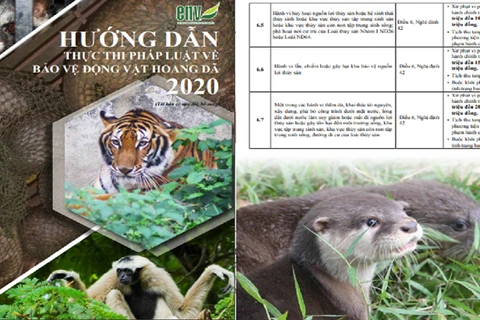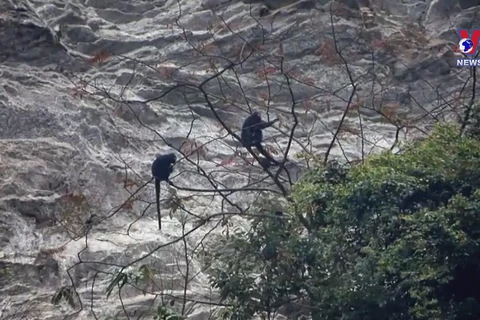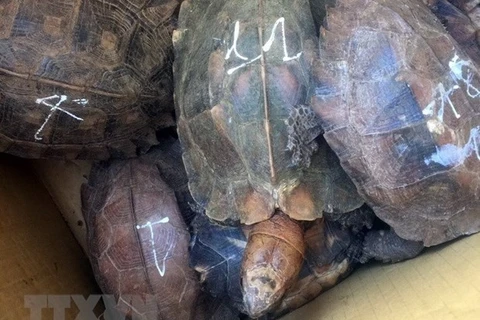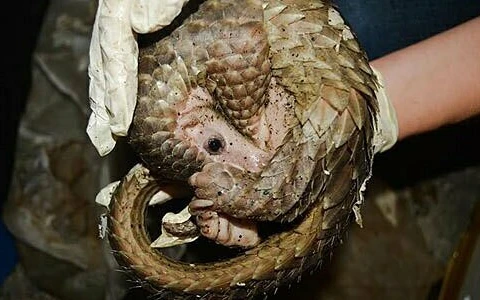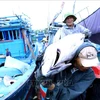Hanoi (VNA) - Results of a survey by EVN with 1,111 people living in Nghe An show that over 96% of respondents want to stop illegal wildlife trade.
Talking to VietnamPlus Electronic Newspaper on May 26, a representative of the Education for Nature Vietnam (ENV) said more than 1,000 respondents in Nghe An province have expressed their wish that the local government should conduct a serious fight to end the illegal wildlife trade and farming.
The survey was conducted by ENV at the end of 2020 by collecting opinions from 1,111 people living in Nghe An. The results showed that more than 96% of people answering the survey expressed their desire to end the illegal wildlife trade in their locality.
In addition, nearly 97% of the interviewees called on local authorities to have a fair and strict handling of violators of the laws on illegal wildlife trade. There should be no exceptions in this matter, they stressed.
According to ENV, Nghe An has been considered a "hotspot" for illegal wildlife trade for many years, especially in the districts of Yen Thanh, Dien Chau and Quynh Luu.
The illegal wildlife trade in these localities is increasingly complicated with traffickers there being very venturesome and dangerous. However, local authorities have not yet found an effective solution to this matter. Statistics show that within 10 years (2010-2020), about 23% of the total of nearly 800 people convicted of wildlife crimes across the country were from Nghe An or Ha Tinh.
Illegal tiger farming, which has been reported many times by domestic and international press, still continues in Yen Thanh, Dien Chau and Quynh Luu districts. In an effort to stop the illegal farming, the People's Committee of Nghe An province in March 2021 issued and sent an urgent dispatch to the Provincial Department of Agriculture and Rural Development, the Provincial Police, and the People's Committees of Yen Thanh, Dien Chau and Quynh Luu districts. The dispatch asks the relevant quarters to directly take part in handling illegal farming of wild animals and strictly handle those who illegally trade, store and transport wild animals.
Illustrative picture (Photo: Hung Vo/Vietnam+)
ENV’s deputy Director Bui Thi Ha said ENV highly appreciates the new direction of the Nghe An People's Committee which aims to completely handle the tiger captive breeding as well as illegal farming of other wildlife animals. However, so far, ENV has not seen any positive signs of change in the province as the problem of captive breeding and illegal wildlife trade is still complicated in the above-said districts.
In such a context, ENV recommended that Nghe An province develop a specific action plan and then implement the plan extensively and sustainably to eliminate the violations.
ENV also suggested that the Ministry of Public Security should establish its own special projects and invest more time and efforts to find out who is behind illegal wildlife breeding and trafficking in Nghe An province, and at the same time, strictly punish violators.
“It is time for all sectors and governments of all levels to listen to people’s aspirations and take action to thoroughly handle the situation of illegal captive breeding and wildlife trade in the districts of Nghe An province. Only when the criminal networks and their leaders are arrested, prosecuted and jailed can these networks be dismantled, making real changes in the fight against wildlife-related crimes," the ENV deputy director stressed.
Wildlife-related crimes are considered serious, with convicted criminals now facing higher penalties and longer prison sentences in accordance with amendments to the 2015 Penal Code adopted by the National Assembly in 2017. Violators may face up to 15 years in prison and fines of up to 15 billion VND (650,000 USD), with penalties rising in line with the quantity of wildlife trafficked.
Vietnam is among the signatories to the Convention on Biological Diversity, the Convention on International Trade in Endangered Species of Wild Fauna and Flora, the 1989 Convention on Wetlands of International Importance, and the UN Convention to Combat Desertification. The country has also stepped up bilateral and multilateral cooperation on wildlife conservation, for example signing an agreement with South Africa in 2012 to put an end to the illegal trade of rhinoceros’ horn./.

